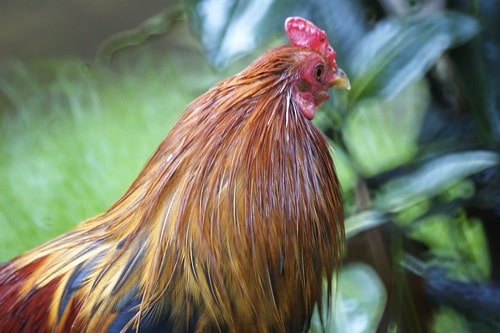 Evolution
Evolution
For that Chicken on Your Plate, Don’t Thank Neo-Darwinian Evolution

If this sounds ungrateful, consider the latest research on the topic reported in BMC Genomics. It suggests persuasively that while the “traditional Darwinian explanation is that over thousands of years, people have bred properties that have arisen through random, spontaneous mutations in the chickens’ genes,” epigenetic inheritance in fact plays a leading role.
In the Origin of Species, Darwin invoked his long experience keeping, breeding and dissecting almost all the English chicken breeds and concluded that chicken in general descended from Gallus bankiva, the “wild Indian fowl.” Modern opinion, not far off, traces our chicken to the Red Junglefowl, Gallus gallus, of southeastern Asia, with a contribution from the Indian Grey Junglefowl. All are related to pheasants with whom they take shelter under the family name Phasianidae. People have been keeping and eating them going back some 8,000 years.
Researchers at Sweden’s Linköping University say that what they’ve found “may lead to a review of the important foundations for the theory of evolution.” It seems that changes in DNA itself don’t explain the rapid explosion of different chicken varieties. Instead, the scientists found evidence of epigenetic changes brought about by stress and other factors experienced under conditions of domestication:
They studied how individual patterns of gene activity in the brain were different for modern laying chickens than the original form of the species, the red jungle fowl. Furthermore they discovered hundreds of genes in which the activity was markedly different.
Degrees of a kind of epigenetic modification, DNA methylation, were measured in several thousand genes. This is a chemical alteration of the DNA molecule that can affect gene expression, but unlike a mutation it does not appear in the DNA structure. The results show clear differences in hundreds of genes.
Researchers also examined whether the epigenetic differences were hereditary. The answer was yes; the chickens inherited both methylation and gene activity from their parentages. After eight generations of cross breeding the two types of chickens, the differences were still evident.
The results suggest that domestication has led to epigenetic changes. For more than 70 % of the genes, domesticated chickens retained a higher degree of methylation. Since methylation is a much faster process than random mutations, and may occur as a result of stress and other experiences, this may explain how variation within a species can increase so dramatically in just a short time.
Our chicken, when they go feral, return to a condition like their junglefowl cousins and can breed with them. No information at present on how the latter taste with BBQ sauce.
Photo credit: Tim Ellis/Flickr.
